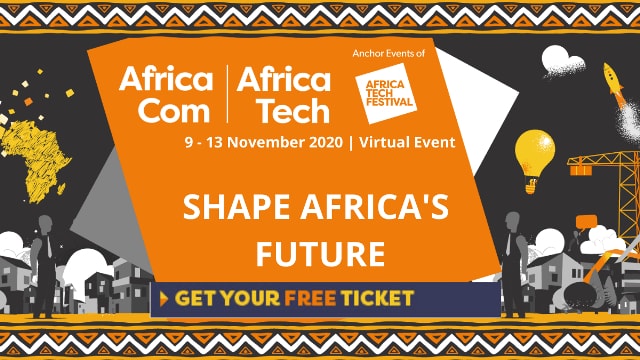It’s a wrap – the first virtual AfricaCom and AfricaTech shows content connects at all levels
The first virtual Africa Tech Festival took place 09-12 November in a year marked by challenge and change. As a physical event, taking place in Cape Town each year for more than two decades, the Africa Tech Festival, incorporating AfricaCom, AfricaTech, AHUB, and other co-located events, has always attracted a global audience of digital infrastructure and emerging technology leaders. In 2020, despite being hosted completely online, it was no different, with registered attendees of over 12 000.
Tom Cuthell, Event Director of Africa Tech Festival at Informa Tech observed: “At the beginning of the year, we had of course, planned for our 23rd physical event on the ground in Cape Town. COVID-19 changed that and we were faced with many unknowns, including a sense of timing as to when to make the final decision to go fully virtual.
“The ultimate success of the virtual Africa Tech Festival ratified our decision to continue, and the favourable outcome can be attributed to the exceptional content, a line-up of outstanding speakers, an array of top exhibitors and the support of numerous industry leading sponsors and partners, including the South African Government. Bringing them all together on a digital platform that allows all participants the opportunity to interact with each other, review the content live, or recap at will, and that asks questions in real-time, has proved to be a winning formula”
Every cloud has a silver lining, so the saying goes, and whilst the devastating fall-out of COVID-19 and its impact topped many discussions, the pandemic has served to accelerate the importance for the continent to dive into digital and its rapid adoption. As expected, connecting the next billion people dominated the majority of the dialogue over the four days – from infrastructure roll-out (and what that looks like), to skills, education and the tools needed to enable digital empowerment. Also high on the agenda, how collaboration, co-operation and partnership are going to be the winning recipe that will forge Africa’s economic revival and sustainability for the future.
Africa’s Digital Decade – what the future holds
A fascinating panel discussion on the last day of the festival, set the scene for what Africa can expect in the next ten years. Off a COVID-constrained base in 2020, the next few years are going to be even more challenging with rising unemployment across the continent, contraction of GDP across the continent and ensuing recessions. COVID has also decreased foreign direct investment across Africa, meaning that investment from within the continent is going to need to grow.
The backbone of any economic revival is the roll-out of telecommunications infrastructure across the continent and the updated regulatory frameworks that will engender this, along with the inclusion of more women and girls in the narrative.
Unchained melody
Once Africa’s connectivity is assured, the type of industries that are predicted to lead the commerce charge across the continent , include fintech and the payment space – Bitcoin and blockchain key among them, including the notion of individuals having agency over their own data and using Bitcoin to monetise their own information. The Fintech sector is predicted to launch Africa’s first true tech Unicorn… watch this space.
Smart energy and internet-related everything, will of course, make a play for the region too.
Speaking of data, Cuthell shared that this year’s virtual Africa Tech Festival saw more than 55 000 messages exchanged between participants. The desire to connect was patent and with the content still available on the platform, until 12th February 2021, it is anticipated that there will be more networking to come.
In conclusion, the first virtual Africa Tech Festival actualised a renewed energy and commitment from all involved, to Africa’s economic resilience and growth.
In case you missed it, here are some of the key speakers who were at Africa Tech Festival in 2020:
· Siya Kolisi, co-Founder, Kolisi Foundation
· Stella Ndabeni-Abrahams, Minister of Communications and Digital Technologies, Republic of South Africa
· Shameel Joosub, Group CEO, Vodacom
· Lillian Barnard, Managing Director, Microsoft South Africa
· Charles Molapisi, Group Chief Technology & Information Officer, MTN
· Alioune Ndiaye, CEO, Middle East and Africa, Orange
· Pinky Kekana, Deputy Minister of Communications and Digital Technologies, Republic of South Africa
· Peter Ndegwa, Chief Executive Officer, Safaricom
· Yolanda Cuba, Group Chief Digital and Fintech Officer, MTN
· Professor Tshilidzi Marwala, Deputy Chair, Presidential 4IR Commission
· Alice Munyua, Director, Africa Innovation and Public Policy, Mozilla
· Nenzeni Babs Duma, CIO, WesBank
· Nitin Gajria, Director – Sub-Saharan Africa, Google
· Izabela Milewska, Digital Skills Global Leader, Amazon Web Services
· Bob Skinstad, Former Springbok Captain and World Cup Winner, Partner, Knife Capital
· Sandra La Bella, Group CIO, Alexandre Forbes
· Emmanuel Lubanzadio, Head of Public Policy for Sub-Saharan Africa, Twitter
· Kojo Boakye, Director, Africa Public Policy, Facebook
· Pamela Coke-Hamilton, Executive Director at International Trade Centre
· Dejan Kastelic, Group Chief Technology Officer, Vodacom.
To register for the platform to view and recap on the sessions, please click here.

